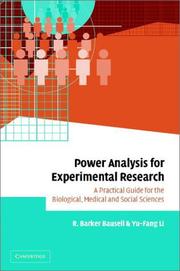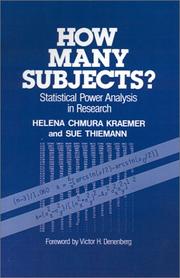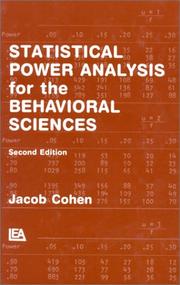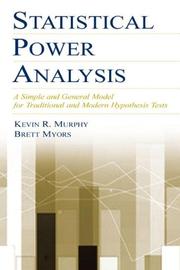| Listing 1 - 7 of 7 |
Sort by
|

ISBN: 1107131820 1280433795 9786610433797 0511331258 1139147560 0511170416 0511064039 0511057709 0511541937 051107249X 9780511064036 9780511057700 9780511072499 9780511170416 9780511541933 9780521809160 0521809169 0521809169 9781280433795 9781107131828 6610433798 9780511331251 9781139147569 9780521024563 0521024560 Year: 2002 Publisher: Cambridge ; New York : Cambridge University Press,
Abstract | Keywords | Export | Availability | Bookmark
 Loading...
Loading...Choose an application
- Reference Manager
- EndNote
- RefWorks (Direct export to RefWorks)
Power analysis is an essential tool for determining whether a statistically significant result can be expected in a scientific experiment prior to the experiment being performed. Many funding agencies and institutional review boards now require power analyses to be carried out before they will approve experiments, particularly where they involve the use of human subjects. This comprehensive, yet accessible, book provides practising researchers with step-by-step instructions for conducting power/sample size analyses, assuming only basic prior knowledge of summary statistics and the normal distribution. It contains a unified approach to statistical power analysis, with numerous easy-to-use tables to guide the reader without the need for further calculations or statistical expertise. This will be an indispensable text for researchers and graduates in the medical and biological sciences needing to apply power analysis in the design of their experiments.
Medicine --- Statistical power analysis. --- Power analysis (Statistics) --- Statistical hypothesis testing --- Health Workforce --- Research --- Statistical methods.

ISBN: 0803929498 9780803929494 Year: 1987 Publisher: Newbury Park (Calif.): Sage,
Abstract | Keywords | Export | Availability | Bookmark
 Loading...
Loading...Choose an application
- Reference Manager
- EndNote
- RefWorks (Direct export to RefWorks)
Quantitative methods in social research --- Mathematical statistics --- Statistical power analysis --- -Statistical power analysis --- Power analysis (Statistics) --- Selectie. Steekproeven omvang --(sociaal onderzoek) --- Statistical power analysis. --- 303.5 Selectie. Steekproeven omvang --(sociaal onderzoek) --- Research --- Statistical methods. --- #SBIB:303H510 --- 303.5 --- Statistical hypothesis testing --- Statistical methods --- Methoden sociale wetenschappen: statistische technieken, algemeen --- research --- Recherche --- Méthodes statistiques --- Research - Statistical methods

ISBN: 0805802835 1134742770 1134742703 0203771583 9780805802832 9780203771587 Year: 1988 Publisher: Hillsdale (N.J.): Erlbaum, Lawrence, Associates,
Abstract | Keywords | Export | Availability | Bookmark
 Loading...
Loading...Choose an application
- Reference Manager
- EndNote
- RefWorks (Direct export to RefWorks)
Statistical Power Analysis is a nontechnical guide to power analysis in research planning that provides users of applied statistics with the tools they need for more effective analysis. The Second Edition includes: * a chapter covering power analysis in set correlation and multivariate methods; * a chapter considering effect size, psychometric reliability, and the efficacy of ""qualifying"" dependent variables and; * expanded power and sample size tables for multiple regression/correlation.
Quantitative methods in social research --- Social sciences --- Probabilities --- Statistical power analysis --- Statistical methods --- #SBIB:303H520 --- -Statistical power analysis --- Power analysis (Statistics) --- Statistical hypothesis testing --- Behavioral sciences --- Human sciences --- Sciences, Social --- Social science --- Social studies --- Civilization --- Probability --- Statistical inference --- Combinations --- Mathematics --- Chance --- Least squares --- Mathematical statistics --- Risk --- Methoden sociale wetenschappen: techniek van de analyse, algemeen --- Probabilities. --- Statistical power analysis. --- Methoden en technieken --- Statistical methods. --- statistiek --- statistiek. --- Social sciences - Statistical methods

ISBN: 0805845267 0805845259 Year: 2004 Publisher: Mahwah (N.J.) Erlbaum
Abstract | Keywords | Export | Availability | Bookmark
 Loading...
Loading...Choose an application
- Reference Manager
- EndNote
- RefWorks (Direct export to RefWorks)
This book presents a simple and general method for conducting statistical power analysis based on the widely used 'F' statistic. The book illustrates how these analyses work and how they can be applied to problems of studying design, to evaluate others' research, and to choose the appropriate criterion for defining "statistically significant" outcomes. 'Statistical Power Analysis' examines the four major applications of power analysis, concentrating on how to determine: *the sample size needed to achieve desired levels of power; *the level of power that is needed in a study; *the size of effect that can be reliably detected by a study; and *sensible criteria for statistical significance. Highlights of the second edition include: a CD with an easy-to-use statistical power analysis program; a new chapter on power analysis in multi-factor ANOVA, including repeated-measures designs; and a new One-Stop PV Table to serve as a quick reference guide. The book discusses the application of power analysis to both traditional null hypothesis tests and to minimum-effect testing. It demonstrates how the same basic model applies to both types of testing and explains how some relatively simple procedures allow researchers to ask a series of important questions about their research. Drawing from the behavioral and social sciences, the authors present the material in a nontechnical way so that readers with little expertise in statistical analysis can quickly obtain the values needed to carry out the power analysis. Ideal for students and researchers of statistical and research methodology in the social, behavioral, and health sciences who want to know how to apply methods of power analysis to their research.
#PBIB:2003.3 --- #SBIB:303H520 --- Methoden sociale wetenschappen: techniek van de analyse, algemeen --- Statistical hypothesis testing. --- Statistical power analysis. --- Methoden en technieken --- statistiek --- statistiek. --- Statistical hypothesis testing --- Statistical power analysis --- Power analysis (Statistics) --- Hypothesis testing (Statistics) --- Significance testing (Statistics) --- Statistical significance testing --- Testing statistical hypotheses --- Distribution (Probability theory) --- Hypothesis --- Mathematical statistics
Book
ISBN: 9781841697741 9780415965552 9781841697758 Year: 2009 Publisher: Mahwah, N.J. Erlbaum
Abstract | Keywords | Export | Availability | Bookmark
 Loading...
Loading...Choose an application
- Reference Manager
- EndNote
- RefWorks (Direct export to RefWorks)
Mathematical statistics --- #SBIB:303H520 --- Methoden sociale wetenschappen: techniek van de analyse, algemeen --- Statistical hypothesis testing --- Statistical power analysis --- Power analysis (Statistics) --- Hypothesis testing (Statistics) --- Significance testing (Statistics) --- Statistical significance testing --- Testing statistical hypotheses --- Distribution (Probability theory) --- Hypothesis
Book
ISBN: 9780691158907 0691158908 9780691192031 0691192030 9780691192277 0691192278 Year: 2019 Publisher: Princeton, N.J. : Princeton Univ. P.,
Abstract | Keywords | Export | Availability | Bookmark
 Loading...
Loading...Choose an application
- Reference Manager
- EndNote
- RefWorks (Direct export to RefWorks)
Why psychology is in peril as a scientific discipline - and how to save it. Psychological science has made extraordinary discoveries about the human mind, but can we trust everything its practitioners are telling us? In recent years, it has become increasingly apparent that a lot of research in psychology is based on weak evidence, questionable practices, and sometimes even fraud. The Seven Deadly Sins of Psychology diagnoses the ills besetting the discipline today and proposes sensible, practical solutions to ensure that it remains a legitimate and reliable science in the years ahead. In this unflinchingly candid manifesto, Chris Chambers draws on his own experiences as a working scientist to reveal a dark side to psychology that few of us ever see. Using the seven deadly sins as a metaphor, he shows how practitioners are vulnerable to powerful biases that undercut the scientific method, how they routinely torture data until it produces outcomes that can be published in prestigious journals, and how studies are much less reliable than advertised. He reveals how a culture of secrecy denies the public and other researchers access to the results of psychology experiments, how fraudulent academics can operate with impunity, and how an obsession with bean counting creates perverse incentives for academics. Left unchecked, these problems threaten the very future of psychology as a science - but help is here. Outlining a core set of best practices that can be applied across the sciences, Chambers demonstrates how all these sins can be corrected by embracing open science, an emerging philosophy that seeks to make research and its outcomes as transparent as possible.
Psychology --- Psychologie --- Research --- Methodology --- Recherche --- Méthodologie --- Psychology, Clinical. --- Methodology. --- Research. --- Philosophy of science --- Méthodologie --- Recherche. --- Méthodologie. --- Psychological research --- Psychology, Clinical --- Academic publishing. --- Adversarial collaboration. --- Alzheimer's disease. --- Ambiguity. --- American Psychological Association. --- Article processing charge. --- Author. --- Bayes' theorem. --- Bayesian. --- Blog. --- Calculation. --- Career. --- Center for Open Science. --- Cherry picking. --- Cognitive psychology. --- Confirmation bias. --- Counting. --- Criticism. --- Data set. --- Data. --- Edition (book). --- Editorial. --- Effect size. --- Estimation. --- Experiment. --- Experimental psychology. --- Explanation. --- Fallacy. --- False positive rate. --- Finding. --- Fraud. --- Funding. --- Guideline. --- Hypothetico-deductive model. --- Impact factor. --- Independent scientist. --- Institution. --- Jargon. --- John Bargh. --- Law of small numbers. --- Literature. --- Manuscript. --- Meta-analysis. --- Misconduct. --- Narrative. --- Null hypothesis. --- Open science. --- P-value. --- PLOS ONE. --- PLOS. --- Paperback. --- Participant. --- Paywall. --- Peer review. --- Percentage. --- Post hoc analysis. --- Postdoctoral researcher. --- Precognition. --- Prevalence. --- Probability. --- Psychiatry. --- Psychological Science. --- Psychological research. --- Psychologist. --- Psychology. --- Psychonomic Society. --- Publication bias. --- Publication. --- Publishing. --- Quantity. --- Raw data. --- Reprimand. --- Reproducibility. --- Reputation. --- Requirement. --- Result. --- Reuse. --- Sample Size. --- Sampling (statistics). --- Science. --- Scientific literature. --- Scientific method. --- Scientific misconduct. --- Scientist. --- Scrutiny (journal). --- Scrutiny. --- Sharing. --- Signature. --- Social psychology. --- Statistical hypothesis testing. --- Statistical power. --- Statistical significance. --- Statistician. --- Statistics. --- Suggestion. --- Tilburg University. --- Type I and type II errors. --- Whistleblower. --- Writing. --- Méthodologie.
Book

ISBN: 9781400846184 9780691137285 9780691137292 Year: 2013 Publisher: Princeton, NJ
Abstract | Keywords | Export | Availability | Bookmark
 Loading...
Loading...Choose an application
- Reference Manager
- EndNote
- RefWorks (Direct export to RefWorks)
Meta-analysis is a powerful statistical methodology for synthesizing research evidence across independent studies. This is the first comprehensive handbook of meta-analysis written specifically for ecologists and evolutionary biologists, and it provides an invaluable introduction for beginners as well as an up-to-date guide for experienced meta-analysts. The chapters, written by renowned experts, walk readers through every step of meta-analysis, from problem formulation to the presentation of the results. The handbook identifies both the advantages of using meta-analysis for research synthesis and the potential pitfalls and limitations of meta-analysis (including when it should not be used). Different approaches to carrying out a meta-analysis are described, and include moment and least-square, maximum likelihood, and Bayesian approaches, all illustrated using worked examples based on real biological datasets. This one-of-a-kind resource is uniquely tailored to the biological sciences, and will provide an invaluable text for practitioners from graduate students and senior scientists to policymakers in conservation and environmental management. Walks you through every step of carrying out a meta-analysis in ecology and evolutionary biology, from problem formulation to result presentation Brings together experts from a broad range of fields Shows how to avoid, minimize, or resolve pitfalls such as missing data, publication bias, varying data quality, nonindependence of observations, and phylogenetic dependencies among species Helps you choose the right software Draws on numerous examples based on real biological datasets
Meta-analysis. --- Evolution --- Ecology --- Philosophy --- Creation --- Emergence (Philosophy) --- Teleology --- Medicine --- Psychometrics --- Social sciences --- Mathematical models. --- Statistical methods. --- Research --- Evaluation --- Statistical methods --- Bayesian analysis. --- Bayesian approach. --- Lepidoptera mating. --- allometric scaling. --- average trends. --- biodiversity. --- collaborative research. --- computer software. --- conceptual tool. --- conservation. --- conventional wisdom. --- data analysis. --- data appraisal. --- data collection. --- data extraction. --- data gathering. --- data quality. --- ecology. --- effect size. --- effect sizes. --- evolution. --- evolutionary biology. --- exemplar studies. --- forest plots. --- imputation methods. --- insufficient data. --- interaction effects. --- invasive plants. --- knowledge gaps. --- large-scale monitoring. --- least-squares method. --- literature search. --- management intervention. --- maximum likelihood estimation. --- medicine. --- meta-analysis database. --- meta-analysis. --- meta-analytic process. --- meta-regression plots. --- missing data. --- moment-based approach. --- non-independence. --- parameter estimation. --- partial information. --- phylogenetic nonindependence. --- phylogenetic relationships. --- plant abundance. --- primary data. --- problem formulation. --- publication bias. --- published studies. --- quantitative research synthesis. --- research evidence. --- research pooling. --- research practice. --- research synthesis. --- sample error. --- sampling. --- scatter plots. --- scientific literature. --- scientific publications. --- scoping search. --- sex ratio theory. --- sexual selection. --- small-scale surveys. --- social sciences. --- statistical analysis. --- statistical inference. --- statistical methodology. --- statistical models. --- statistical power. --- statistical software. --- statistical tool. --- study quality. --- study replication. --- study selection. --- subjectivity. --- systematic research synthesis. --- systematic review. --- systematic reviews. --- systematic search. --- temporal change. --- temporal trends. --- visualization.
| Listing 1 - 7 of 7 |
Sort by
|

 Search
Search Feedback
Feedback About UniCat
About UniCat  Help
Help News
News